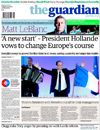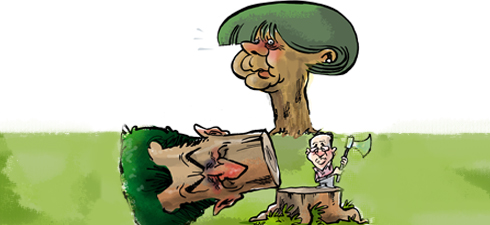“The change France needs... President Hollande has a rare opportunity to reshape the political landscape.... ”. For the London daily, the Socialist candidate “has won a stunning victory, not just for himself... nor for France, but for the left in Europe, too,” writes The Guardian.

Nicolas Sarkozy is the 11th European leader to fall since the banking crisis broke, and this result is more than just a shot across the bows for the former Sarkozy loyalists in Ms Merkel or David Cameron. France's new direction is a mortal blow to the austerity compact which has been Europe's anchor response to the crisis.
"Frau Merkel, I have arrived", leads Frankfurt daily, Frankfurter Rundschau. Following his speech, the president-elect announced that his first foreign visit would be to the German Chancellor, who is expected to accommodate this new partner despite their ideological differences:

Merkel would not be Merkel if she were not capable of quickly changing course. She has no ideological problems with the Social Democrats [with whom she governed from 2005 to 2009], even if they do call themselves socialists. Hollande will not proclaim a revolution. He must learn to adapt, as Merkel did during the Greek crisis.
"Hollande wins, the challenge for Europe begins", leads Milan daily, Corriere della Sera which calls the new French president “an ordinary leader for extraordinary times".

The message from this month of May in France, in these times of crisis, of the decline of the citizen and a rise in mistrust of politics, is full of hope. For France and for the Europe that is looking to France. [... It] is also a defensive choice, to resist a Europe of sacrifices without fairness, and rigour without growth. [...] France under Hollande no longer dreams of socialism in one country, but a little more of social democracy in Europe.
For El Mundo, "Hollande's victory opens up uncertainty in Europe". The conservative daily is worried about the shape of the "new era" opening up "for France and for the rest of the continent."

Never has a presidential election in France had such repercussions across Europe. [...] The socialist candidate’s victory breaks the hegemony of the centre-right of the last decade and kindles doubts over the cohabitation with Chancellor Angela Merkel, with whom [outgoing president Nicolas] Sarkozy pushed for fiscal union and the austerity policies [...].
"A fresh start for Europe," writes De Morgen. The paper, however, believes "the socialist Hollande (is) on a collision course with Germany over the austerity question." In an editorial the paper adds:

The question of whether Hollande can pull off this turnabout in Europe [towards growth measures], remains wide open. We are already looking forward to his first trip to Berlin, where he is to conclude a historic compromise with an unbending Merkel. These discussions will take place in a heated climate, following the parliamentary elections that fractured the political landscape in Greece yesterday.... Europe has got a little redder since yesterday. [...] At the same time, though, the storm clouds over the continent have darkened.
In Stockholm, Dagens Nyheter notes that, while the new president has chosen a more tolerant and open path on immigration and minorities than that of Nicolas Sarkozy, “ he does raise troubling questions on economic policy:

If Hollande does break the fiscal pact, it will cause serious problems. Europe needs growth, but without an effective brake on big budget deficits among the member states the euro will struggle to survive. This would undermine the monetary union and (the member states’) ability to make joint decisions. It seems unlikely therefore that Hollande is serious about renegotiating the pact. More likely is that he will be content to add an innocuous passage on the importance of growth.
Writing in the Prague daily Hospodářské noviny, editorialist Martin Ehl believes that "another Europe" has emerged from this "weekend election." The presidential elections in France and the legislative elections in Greece reveal that the Old Continent is facing "a new French revolution". This shakes up the consensus on European integration, which is going through its deepest crisis since the 1950s:

Europeans expect more from their leaders than (blunt) cuts with the knife. [...] Following the fiscal pact, Europe will need to think innovatively on the economic front.
Was this article useful? If so we are delighted!
It is freely available because we believe that the right to free and independent information is essential for democracy. But this right is not guaranteed forever, and independence comes at a cost. We need your support in order to continue publishing independent, multilingual news for all Europeans.
Discover our subscription offers and their exclusive benefits and become a member of our community now!












